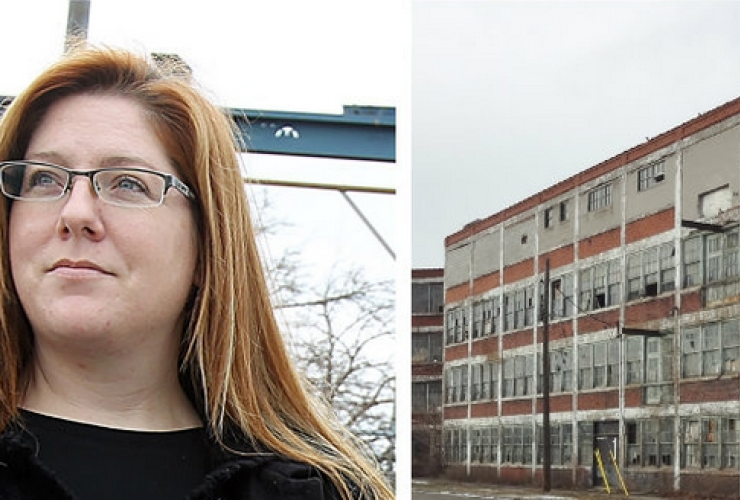Sweeping changes to trade laws could endanger more than 20,000 Canadian manufacturing jobs, many of them in factories dotted around swing ridings the Conservatives are fighting to keep in the federal election.
Under the Trans Pacific Partnership (TPP) recently signed by the Harper government with 11 other Pacific Rim nations, Ottawa has committed to completely eliminating import tariffs in five years, including for auto parts that can be manufactured more cheaply abroad and even outside the TPP zone.
“I think it plays badly in some of the places where Stephen Harper is looking to gain seats and keep seats in the vote-rich manufacturing heartland of Ontario. In these communities – particularly auto communities – they’ve seen nearly a decade of devastation under Stephen Harper’s watch,” said Bill Murnighan, director of research for Unifor.
He maintained that 450,000 manufacturing jobs have been lost under the Conservatives’ watch, including 38,000 auto plant jobs in the last decade, owing in large part to successive trade deals that Ottawa has signed with other nations.
As a result, the traditional manufacturing hubs of Windsor, Kitchener-Waterloo, London, and the Greater Toronto Area (GTA) communities of Oakville, Brampton, Mississauga, and Etobicoke have already been decimated by lay-offs.
According to Unifor figures, the TPP could result in another 7,100 layoffs in the GTA, 2,180 in Windsor, 2,520 in London, 1,980 in Waterloo, 940 in Oshawa, and 520 in Niagara, among others.
It is these very communities that have now emerged as election battlegrounds, as Justin Trudeau’s Liberals vie to regain seats they lost in 2011 when Harper won a majority government.
However it is the NDP that has now emerged as a serious contender in select ridings such as Essex near Windsor, where consistent NDP opposition to the TPP has struck a chord among people struggling with high unemployment, in a riding that was once one of Canada’s most prosperous.
“We already know that Stephen Harper’s secret TPP deal puts jobs and wages at risk, will increase the price of life-saving medication, and harms our right to protect our environment,” said Mulcair in an Oct. 12 statement. “What else is in this agreement that puts Canadian jobs and rights at risk?”
Chief among the both the Liberals’ and NDP’s critiques of the TPP is that the full details have not yet been made public as Canada heads into an election next week.
“Stephen Harper has already tried to hide from Canadians how many jobs his secretive TPP deal will cost Canadians,” said NDP auto critic Brian Masse on Oct. 10. “Now, we learn the Conservatives cut backroom side-deals that could put even more jobs at risk.”
Trudeau also urged the Harper government to be open and honest when conducting trade talks and defend Canadian national interests, while voicing support for free trade in an Oct. 5 statement.
“The Trans-Pacific Partnership stands to remove trade barriers, widely expand free trade for Canada, and increase opportunities for our middle class and those working hard to join it. Liberals will take a responsible approach to thoroughly examining the Trans-Pacific Partnership. The Harper Conservatives have failed to be transparent through the entirety of the negotiations – especially in regards to what Canada is conceding in order to be accepted into this partnership,” said Trudeau.
The Liberal leader promised that if elected, a Liberal government would “hold a full and open public debate in Parliament to ensure Canadians are consulted on this historic trade agreement.”
Nuts and bolts
According to an Oct. 7 Press Progress report, vehicles without tariffs must be built with at least 60 per cent North American parts, under the present NAFTA rules.
Under the TPP, that's been reduced to 45 per cent, meaning that 55 per cent of a car sold tariff-free could be built using parts made in Mexico.
As for the parts themselves, Murnighan said that a component such as engines traditionally had to be made in those countries who sign trade treaties with one another, but under TPP regulations a widget could be manufactured in a low-wage economy outside the newly-inked deal’s member zone.
“That is a big win for car companies looking to export vehicles into North America at a reduced price and there’s different content rules for different auto parts,” said Murnighan.
He contended that no free trade deal ever benefited industrial workers, saying that they always resulted in manufacturing jobs being shredded.
“It’s not working and I think this election gives Canadians a good opportunity to reflect on that,” said Murnighan.




Comments